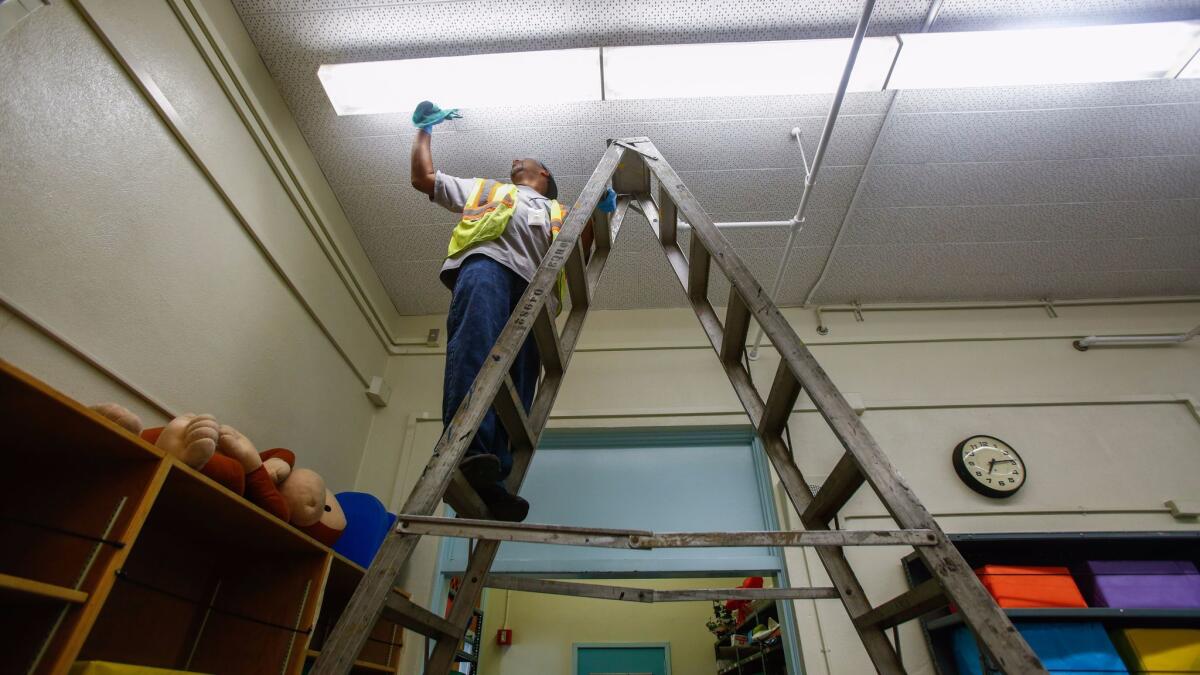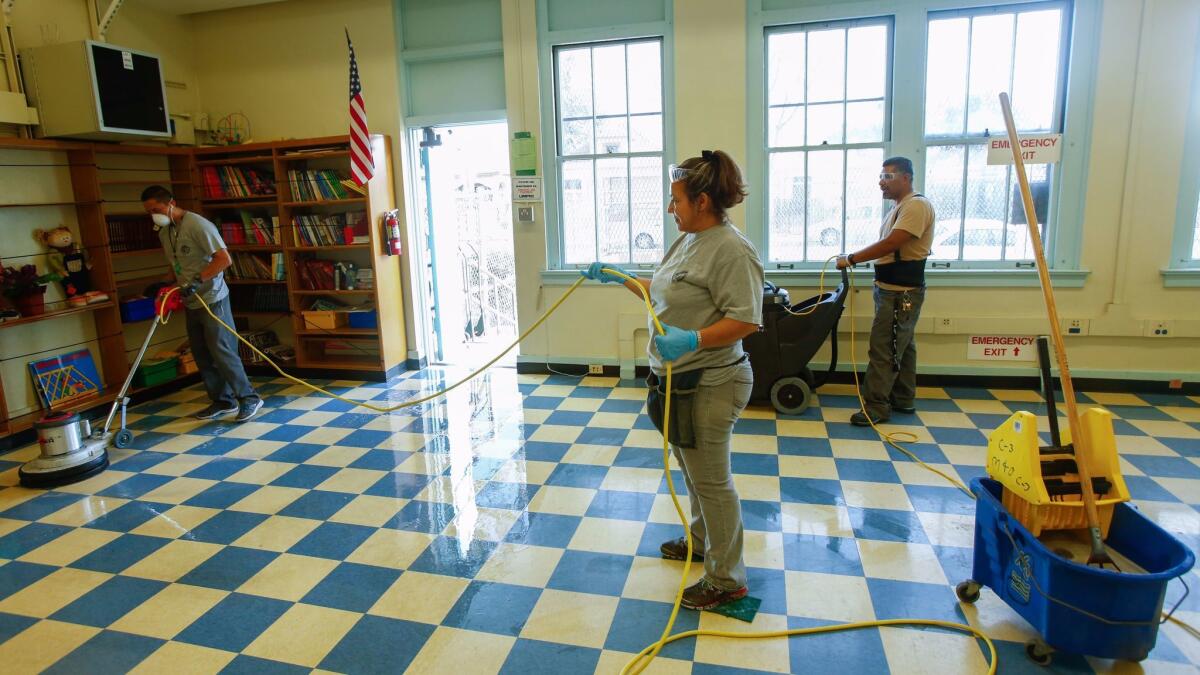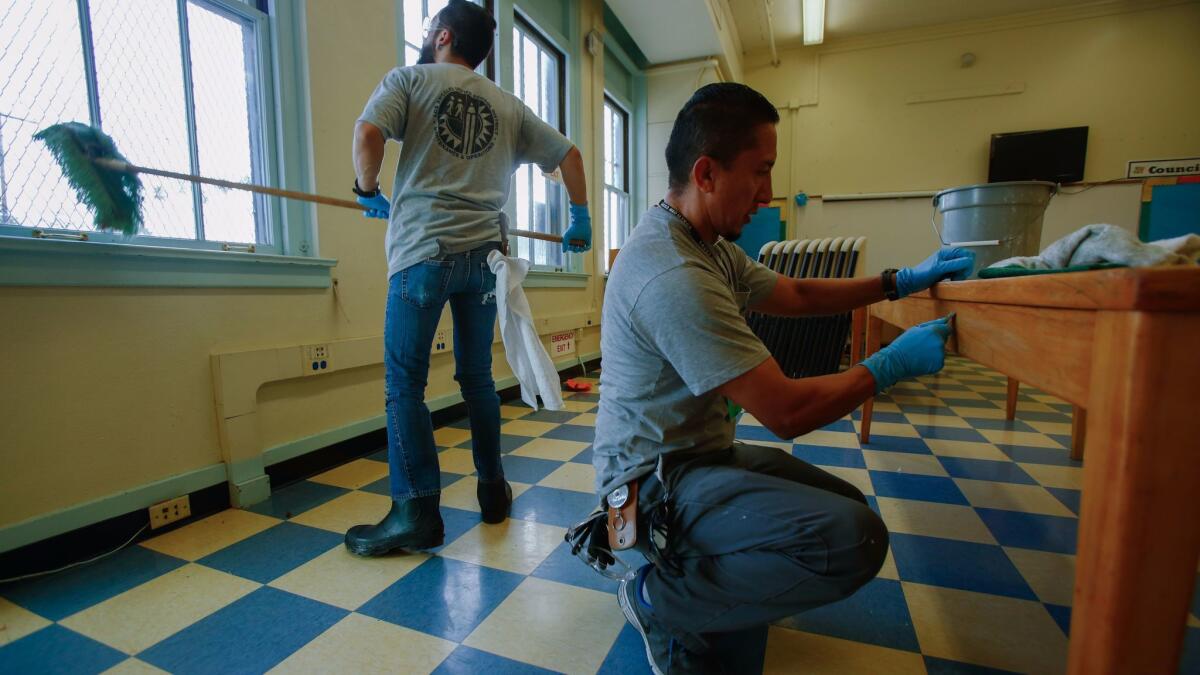Deep cleaning is a deep challenge for L.A. Unified

- Share via
Before students arrive in their back-to-school best to start a new school year, L.A. Unified prepares for months: dusting classroom blinds on both sides, laying down six coats of wax in hallways, splashing apple cider vinegar into newly sanitized toilets.
L.A. schools are expected to open their doors spick-and-span, despite smaller crews, constricted budgets and lots of wear and tear.
Over the summer, as part of a broad push for improvement, the newly configured Board of Education focused on that expectation by passing a resolution that requires Supt. Michelle King to verify in writing “that schools and classrooms are ‘ready to learn’ for the first day of school” — a readiness that includes “deep cleaning.”
The implication was that the new sheriffs in town would demand more and better — and, if unsatisfied, could decide to clean house in their own way.
When the board passed its new edict in July, deep cleaning already was well underway as always. It was happening without additional money or staff because the mandate didn’t come with any.
The summertime deep cleaning of schools is laborious and time-consuming. Cleaning a single classroom often takes a crew of two at least a day.
All furniture must be moved out — including desks, file cabinets and bookcases.
You start at the ceiling because students are resourceful at getting things up there, said Edna Logan, a Building and Grounds worker with L.A. Unified for nearly 30 years.
Everything gets dusted: the tops of lights, projection equipment, clocks, blackened air vents, windowsills, corners.
You scrub the walls with a special solution to remove marks.
You attack the floor with a degummer stick featuring a blade on a long handle.
Sweeping and mopping are just the start for each floor, which then gets soaked for five to 10 minutes in wall-wash solution. A stripping machine applies the next cleaning liquid, which a different machine picks up, working through coats of wax and stains that require extra attention.
Then come two rounds of rinsing with cider vinegar and water, followed by five coats of Poly 85 wax (six for hallways), with at least 20 minutes of drying per coat.
Bathrooms don’t have furniture to remove, but they require more chemicals and repeated sanitizing.

“We only get to do the most thorough cleaning once a year, so we try to do the best job we can,” said Logan, who has made it to the top Building and Grounds pay rung of $17 per hour.
Logan works at the Esteban Torres High campus in East Los Angeles, which has five independent high schools.
During the school day, the Building and Grounds staff is made up of a plant manager, a daytime custodian and two restroom attendants — responding to constant calls. Four workers are on the after-school swing shift, including Logan and an assistant plant manager.
During the summer, the entire crew works on deep cleaning — except the restroom attendants, whose jobs aren’t funded over the break. They have to work around summer school, special events and sports practice.
Schools as large as Torres used to have 18 to 22 Building and Grounds workers, said Conrado Guerrero, president of Local 99 of Services Employees International.
The district acknowledges the thinner staffing. According to recommended industry standards, the district has 31% of the Building and Grounds staff it needs, said Adrian Pacheco, an area facilities service director.
Even so, the summer cleaning gets done, often with the help of overtime and private contractors, said Roger Finstad, the district’s director of maintenance and operations. The deep cleaning occurs at the start of the budget year, giving the district the flexibility to spend more. But finding money to keep up appearances isn’t so easy; conditions can deteriorate over the school year.
With a shortage of staff, workers say, some school bathrooms remain locked because there aren’t enough people to maintain them.
The summer projects include cleaning and repairs for 30,000 classroom air conditioners. This task became a particular priority with the early-start schedule, which added school days in the August heat.
In response to the board directive, district staff made a formal tally. As of Aug. 3, there were 1,656 uncompleted service calls related to heating, ventilation and air conditioning systems — which, it turns out, is typical and maybe even a lighter load than usual. District officials promised that by Tuesday, only six schools would have three or more classrooms without air conditioning. And they said those repairs would be done by the end of the first week.
Still, the cleaning and maintenance crews won’t get to everything.
“We do not have the staffing to scrape the gum and candy from the seats and chairs and desks,” said Logan. “So that goes on from year to year.”
At the least, workers are supposed to wipe all furniture with disinfectant, said operations program manager Jeffrey Prang.

New school board president Ref Rodriguez, who wrote this summer’s resolution, said he wanted to make sure all schools received an equally thorough going-over.
“Over the last two years, I have received anecdotal information that some schools seemed like they had been deep-cleaned, while other schools seemed like they had been lightly touched,” Rodriguez said.
At Esteban Torres High, Logan weighed in on the new directive after a long, grimy day that included such tasks as treating and scrubbing urinals.
“My first response to that was: Great, maybe now we’ll get the additional help we need,” she said. “But nothing has changed so much, to be honest with you.”
More to Read
Sign up for Essential California
The most important California stories and recommendations in your inbox every morning.
You may occasionally receive promotional content from the Los Angeles Times.











